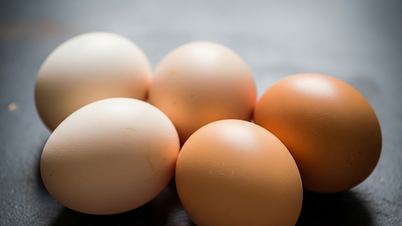Nutritional composition of eggs
According to the United States Department of Agriculture (USDA), a medium egg contains about 70 calories, 6 grams of protein, 5 grams of fat, and 187 milligrams of cholesterol.
Eggs contain vitamins A, D, E, K, B1, B6, B12 and other vitamins, of which vitamins D and B12 are relatively high. Vitamin D helps absorb calcium, which plays an important role in bone and muscle development. Vitamin B12 helps the body's nervous system function normally.
The protein in eggs is good and contains essential amino acids needed by the human body, which can provide the body with the necessary energy and repair tissues.
Eggs are divided into whites and yolks, and the nutritional content of these two parts is very different. Egg whites are low in calories and rich in protein. Egg yolks mainly contain fat, minerals and vitamins. Compared with egg whites, egg yolks are a more complex combination.

Eating eggs in the morning is very good for your health.
Health benefits of eggs
Eggs have always been considered a near-perfect ingredient in the world of nutrition. A small egg can provide almost all the nutrients needed by the human body.
Japanese nutritionist Maki Matsuda said that lecithin in egg yolks not only helps the body regenerate and rejuvenate, but can also improve blood circulation and inhibit the accumulation of visceral fat. Egg whites contain Albumin, a good protein, which helps the body fight aging and form muscle cells.
In addition, egg yolks contain a particularly notable nutrient called choline, which helps promote the body's ability to metabolize lipids. Choline is a neurotransmitter in the brain, an important nutrient for brain development and the prevention of dementia.
In addition to fighting dementia, expert Maki Matsuda also said that eggs can help sleep well and improve metabolism because eggs are rich in tryptophan, which reduces stress. It also helps prevent breast cancer in women.
Is eating eggs for breakfast good for your health?
Expert Maki Matsuda recommends everyone to eat eggs for breakfast. Eating eggs in the morning not only helps you get a rich source of energy for the body, but also increases the ability to concentrate.
The number of eggs consumed per day is 1-2 eggs is relatively suitable. Before eating eggs, you should not drink tea or eat with soybeans, because this will hinder the process of food digestion and nutrient absorption. In addition, you should not eat raw eggs or soft-boiled eggs to avoid bacterial contamination or food poisoning.
Source: https://vtcnews.vn/an-trung-vao-bua-sang-co-tot-cho-suc-khoe-ar909053.html



![[Photo] The 5th Patriotic Emulation Congress of the Central Inspection Commission](https://vphoto.vietnam.vn/thumb/1200x675/vietnam/resource/IMAGE/2025/10/27/1761566862838_ndo_br_1-1858-jpg.webp)
































![[Photo] Party Committees of Central Party agencies summarize the implementation of Resolution No. 18-NQ/TW and the direction of the Party Congress](https://vphoto.vietnam.vn/thumb/1200x675/vietnam/resource/IMAGE/2025/10/27/1761545645968_ndo_br_1-jpg.webp)

![[Photo] National Assembly Chairman Tran Thanh Man receives Chairman of the House of Representatives of Uzbekistan Nuriddin Ismoilov](https://vphoto.vietnam.vn/thumb/1200x675/vietnam/resource/IMAGE/2025/10/27/1761542647910_bnd-2610-jpg.webp)











































































Comment (0)